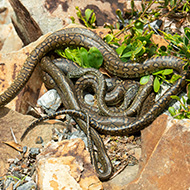
The RSPCA calls on producers to update the show 'in line with public opinion'.
The RSPCA has reported a record number of complaints about the use and portrayal of live animals in this year’s ‘I’m a Celebrity - Get Me Out of Here’.
The animal charity says that some 17,000 complaints were made to ITV Viewer Services this year alone, and that despite these complaints, it is 'disappointed to see that nothing has changed'.
RSPCA chief executive Chris Sherwood called on the production company to 'think again' and 'entertain the animal-loving UK public without resorting to anti-animal trials'.
"Sadly, we are once again seeing many live animals on our TV screens put in situations that could compromise their welfare for a quick laugh,” he said. “We are also concerned at the way the programme portrays animals; it risks trivialising their lives for the sake of light ‘entertainment’.
“With people discussing how scared they are, and animals portrayed in such a negative light, this programme is a long way from the RSPCA’s vision of a world where all animals are respected and treated with kindness and compassion.”
The use of bugs, snakes and other creatures has been a constant feature of I'm a Celebrity since it first aired in 2002.
The RSPCA believes that – as well as causing distress to animals - the programme risks a negative portrayal of animals which may cause viewers to develop negative attitudes towards certain species. There is also concern that those watching the programme may seek to mimic particular 'Bushtucker Trials', it said.
Chris added: "It’s encouraging that a record 17,000 of our supporters have already written to ITV this year to air their views. We believe it is very possible to produce this programme without compromising the welfare of animals, so urge all those connected with 'I'm a Celebrity' to re-think and update this show in line with public opinion."



 The Veterinary Medicines Directorate (VMD) is inviting applications from veterinary students to attend a one-week extramural studies (EMS) placement in July 2026.
The Veterinary Medicines Directorate (VMD) is inviting applications from veterinary students to attend a one-week extramural studies (EMS) placement in July 2026.